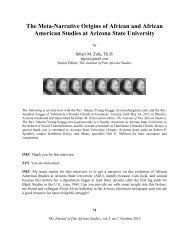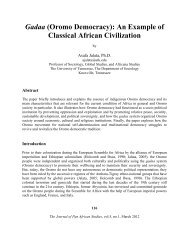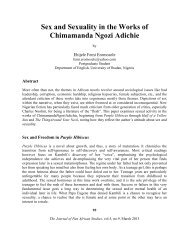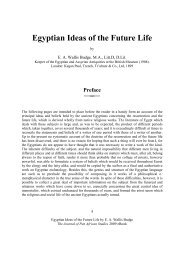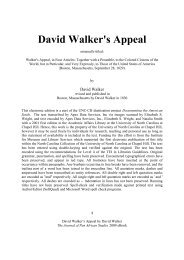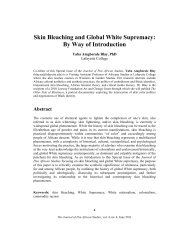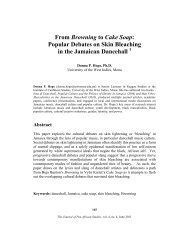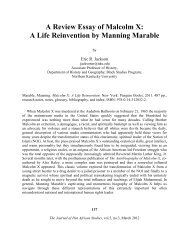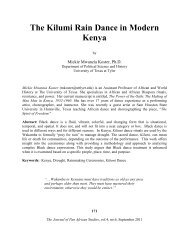The Adaptation of Swahili Loanwords From Arabic - Journal of Pan ...
The Adaptation of Swahili Loanwords From Arabic - Journal of Pan ...
The Adaptation of Swahili Loanwords From Arabic - Journal of Pan ...
You also want an ePaper? Increase the reach of your titles
YUMPU automatically turns print PDFs into web optimized ePapers that Google loves.
It seems that where a borrowed word has three or more vowels in a row, some are deleted so that<br />
at most two remain. This is what we see in /iddaaa/ → dai ‘claim’, /aib/ → aibu ‘shame’ and<br />
/baia/ → bei ‘price’. What then emerges is that Kiswahili can comfortably accommodate two<br />
vowels occurring in a row; it is not in the tendency <strong>of</strong> employing consonant epenthesis to break<br />
vowel clusters. In that case, when a loanword has a hiatus, either vowel syncope can be<br />
employed to reduce the cluster or the word is adapted the way it is with no changes. <strong>The</strong><br />
constraint that is violated in these examples is ONSET.<br />
/ baia / → bei<br />
Input: / baia / *COMPLEX VOW ONSET IDENT-IO(F) MAX-V<br />
a. ba.i.a * *!<br />
b. � be.i * * *<br />
c. bai.a *! *<br />
/aib/ → aibu<br />
Input: / aib / *COMPLEX VOW NOCODA DEP-IO ONSET<br />
a. � a.i.bu * * *<br />
b. ai.bu *! * *<br />
c. a.ib.u *! * * * *<br />
d. a.ib *! * *<br />
Feature Change<br />
Other changes noted in this data have got to do with the phonemes themselves. <strong>The</strong>re are some<br />
phonemes that are found in <strong>Arabic</strong> but are not in the Kiswahili phonemic inventory. If a<br />
loanword has such a phoneme, then it has to be changed to the nearest equivalent in the recipient<br />
language. Below are examples where <strong>Arabic</strong> /q/ and /kh/ are realized as /k/ and /h/ respectively<br />
in Kiswahili.<br />
/q/ → [k]<br />
(19) waqf → wakfu /wak.fu/ ‘religious endowment’<br />
wa:faq → afiki /a.fi.ki/ ‘to agree with’<br />
aqd → akidi /a.ki.di/ ‘celebrting a wedding’<br />
aql → akili /a.ki.li/ ‘intelligence’<br />
usquf → ask<strong>of</strong>u /a.sko.fu/ ‘bishop’<br />
ibri:q → birika /bi.ri.ka/ ‘kettle’, ‘cistern<br />
ta:ri:kh → tarehe /ta.re.he/ ‘date’, ‘chronology’, ‘annals’<br />
waqt → wakati /wa.ka.ti/ ‘time’<br />
ya:qu:t → yakuti /ya.ku.ti/ ‘ruby’, ‘sapphire’<br />
58<br />
<strong>The</strong> <strong>Journal</strong> <strong>of</strong> <strong>Pan</strong> African Studies, vol.2, no.8, March 2009



